by: Corey Lynn
It’s no secret that data mining and surveillance have reached an all time high in the U.S. and throughout the world, so it should come as no surprise that it was built into the design of social emotional learning (SEL) programs. Perhaps, what is less known is the social credit score system that the globalists have been building from all of this data mining, so as to control people’s livelihoods in every aspect.
This 9-part series has already revealed what the PreK-Adult lifelong learning SEL programs are really about, how it originated, who the key implementers and funders are, the billions of dollars pouring into it, and the future repercussions if this is allowed to continue. This chapter will dive into some of the data mining to show how the globalists are not only molding minds and adjusting attitudes from it, but building a social credit score that’s attached to each person’s digital identity citizenship.
READ:
Part 1: Introduction
Part 2: The Programming
Part 3: Spirituality in Education Programming
Part 4: WEF Vision for Global Education System
Part 5: U.S. Department of Education & Multiple Agencies Involved
Part 6: Private Sector Funding
Part 7: Legislation and Billions in State & Federal Funding
Below are examples of how many ways children are being surveilled and manipulated through data mining. This is not a comprehensive list, so one can only imagine how much worse this actually gets. And remember, this data is forever and will follow each child into adulthood so all decisions can be made for that adult based on their social credit score. They have long been gathering data on adults, so by doing all of this it allows them to run these operations from cradle to grave.
Digital License for Children
Much like the Australian “pen license,” Australia is now moving forward with a “digital license” for children, but the difference is that a “digital license” is tracked for data mining, while establishing a digital identity for the “global citizenship” that the World Economic Forum has raged on about. In typical fashion, Australia and New Zealand are both rolling this out under the guise of “internet safety” for children. They are aggregating data on the children and sharing it internationally because this system is likely to expand across the globe – a dream come true for the globalists. This program is also ready to kickstart in a country in South East Asia that hasn’t yet been announced.
The ‘e-Smart Digital License+‘ is allegedly to empower students to “build digital intelligence” in students aged 10-14 years. They describe this program as an interactive eLearning platform for students to develop social and emotional skills to navigate the online world. Meanwhile, they are measuring the programs impact so they can tweak it as they see fit, while aggregating the data across countries. eSmart also has over 2,200 eSmart Schools throughout Australia, which they call the “behavior-change initiative.”
Why do I believe this little venture will expand on a global scale? Because not only does it go hand-in-hand with the overall SEL psychological agenda, but e-Smart Digital License is brought to you by the DQ Institute and Alannah & Madeline Foundation, who are partnered with Accenture who is funded by the Rockefeller Foundation. Accenture is bringing their Next Gen Strategy to teenagers around the world. Coincidentally, Accenture and the Rockefeller Foundation are also teamed up through ID2020, along with their cozy cohorts – Gavi, Microsoft, and IDEO. ID2020 is explained in chapter 3 of Corey’s Digs book on the Global Landscape on Vaccine ID Passports which reveals the biggest players in the digital ID, QR code, blockchain, to CBDC agenda to control every person’s access and spending abilities.
USAID’s Data Jackpot
As covered in part 7 of this report, USAID is all over this agenda, having funded countless research projects and data measurements to ensure the SEL program expands on an international level.
Within days of publishing part 7 of this report, which contained a direct link to USAID’s ‘Social and Emotional Learning (SEL) Systematic Review‘ final report from August 2021, USAID abruptly removed it from their website. This could just be a coincidence, but it’s been on their site for quite some time now.
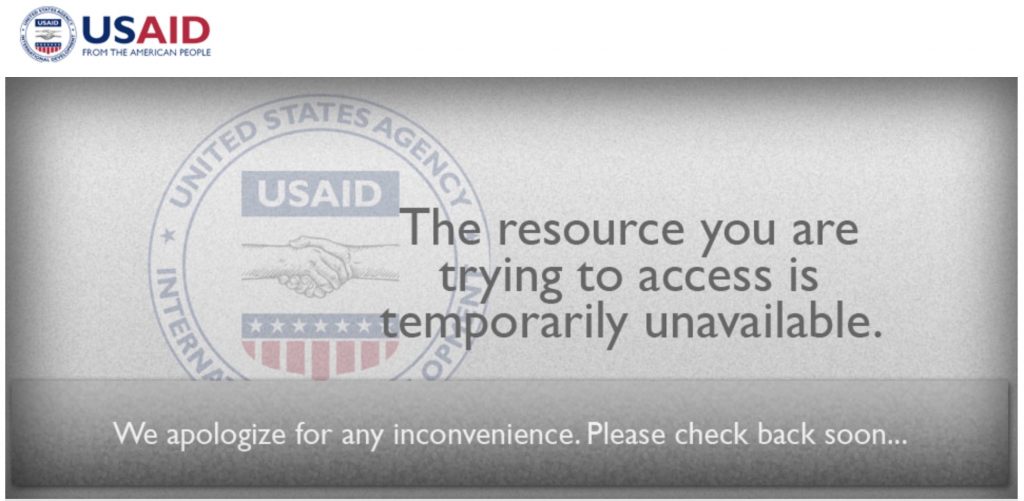
Their full report can be downloaded here directly from Corey’s Digs site, who knew well enough to grab it before it was removed. This particular study focused on low and middle-income countries to carry out a wide range of training, surveys, and data aggregation, but these same “studies” and “systems” are also being implemented in developed countries.
Part of USAID’s “rationale for this review” is:
“The 2018 USAID Education Policy elevated social-emotional skills to be equal to literacy and numeracy as key priorities, all of which are “foundational to future learning and success” (USAID, 2018, p. 4). In 2019, USAID released the Social and Emotional Learning and Soft Skills USAID Policy Brief to further clarify definitions, intended outcomes, and areas for future learning (USAID, 2019). USAID’s prioritization of social and emotional learning (SEL) comes in response to emerging evidence, primarily from the United States, Europe, and the broader Global North. Nearly half of all USAID education programs self- describe as addressing SEL, demonstrating the high prioritization of these skills alongside literacy and numeracy.”
Since the focus of this chapter is specific to data mining and surveillance, Scroll down to Annex E on page 131: Complete Database of SEL Measures Used. Here, one can find an extensive list of the tests, questionnaires, interviews, and measurements being done on children, which focuses on a broad array of emotional and behavioral dissections, such as:
• Aggression questionnaire
• Behavioral and emotional rating scale
• Child behavior checklist
• Child depression inventory
• Children’s attribution and perceptions scale
• Empathy scale
• Creative thinking questionnaire
• Development assets profile
• Difficulties in emotion regulation scale
• Emotion regulation questionnaire
• Emotional intelligence profile
• Expected life evaluation
• Fortitude questionnaire
• Individual behavior and life skills questionnaire
• Inventory of socially supportive behaviors
• Moods and feelings questionnaire
• Preschool self-regulation assessment
• Rapid assessment of cognitive and emotional regulation
• Vulnerability assessment
In all, there were 106 SEL measures used for aggregating data, with some of them having multiple studies. The World Economic Forum, USAID, CASEL, U.S Department of Education, and all other organizations affiliated with pushing the SEL agenda always refer to it as “interventions.” Their “approach” to these interventions is spelled out quite well in Figure 2 of USAID’s report, just to recap:
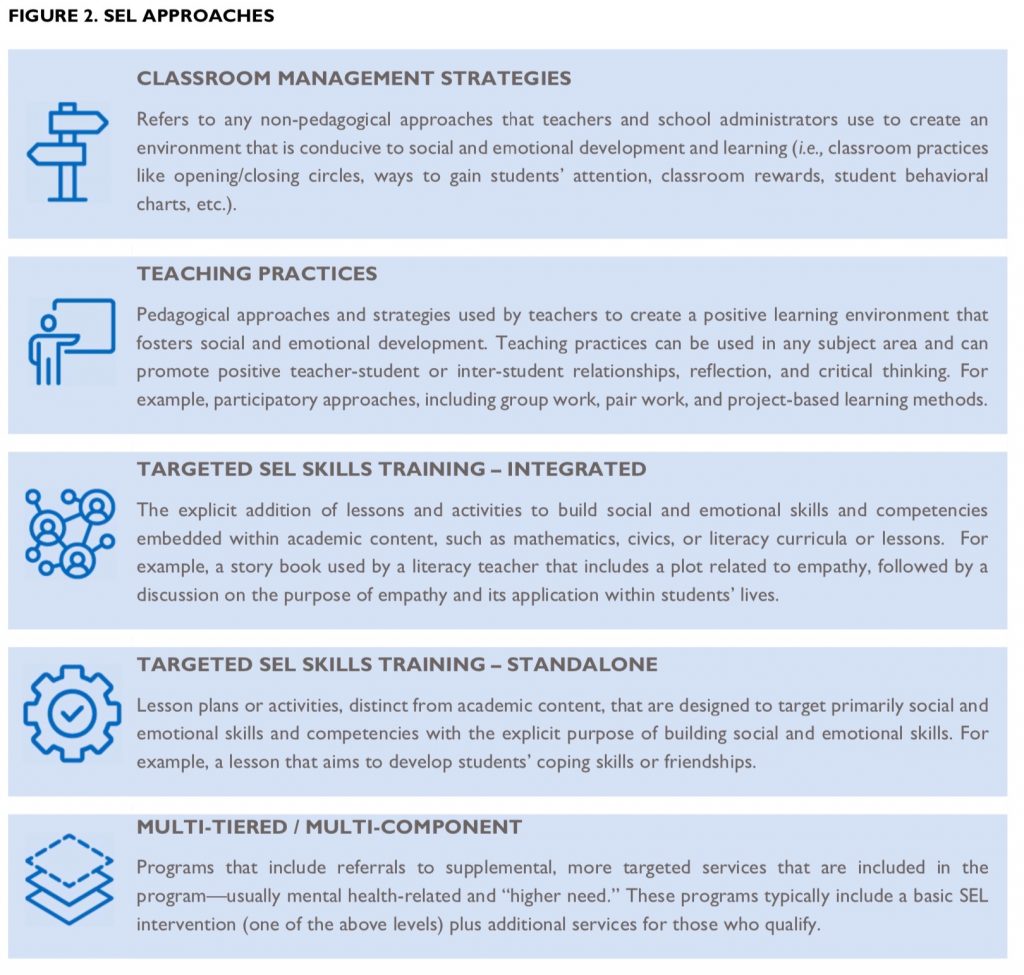
Organization for Economic Cooperation and Development (OECD) International Survey
The international survey rolled out by the OECD was covered in part 5 of this report, but is important to reiterate, because the OECD is also heavily involved with AI, blockchain, and the digital identity agendas. While reviewing this report, it becomes quite apparent that the same organizations involved in the digital ID agenda, Covid agenda, and 2030 agenda, are also involved with the SEL agenda. There’s good reason for that.
The OECD created the international“Survey on Social and Emotional Skills” to identify and assess practices that foster or hinder the obedience training of social and emotional skills for 10 and 15-year-old students, by collecting data from parents, students, teachers, and school principals, which they then use to assess typical behaviors, thoughts, and feelings.

The survey itself asks questions pertaining to the student, parent’s background characteristics, family, school, and community. It’s a wealth of data for the manipulation giants, and parents have been willingly filling these surveys out across the globe.
The background for their measuring of social and emotional skills, can be reviewed in this 19-page PDF. The OECD’s Programme for International Student Assessment (PISA) and the Survey of Adult Skills (PIAAC) decided to expand their data mining to include social and emotional skills.
Figure 1 depicts the structure of social and emotional skills:
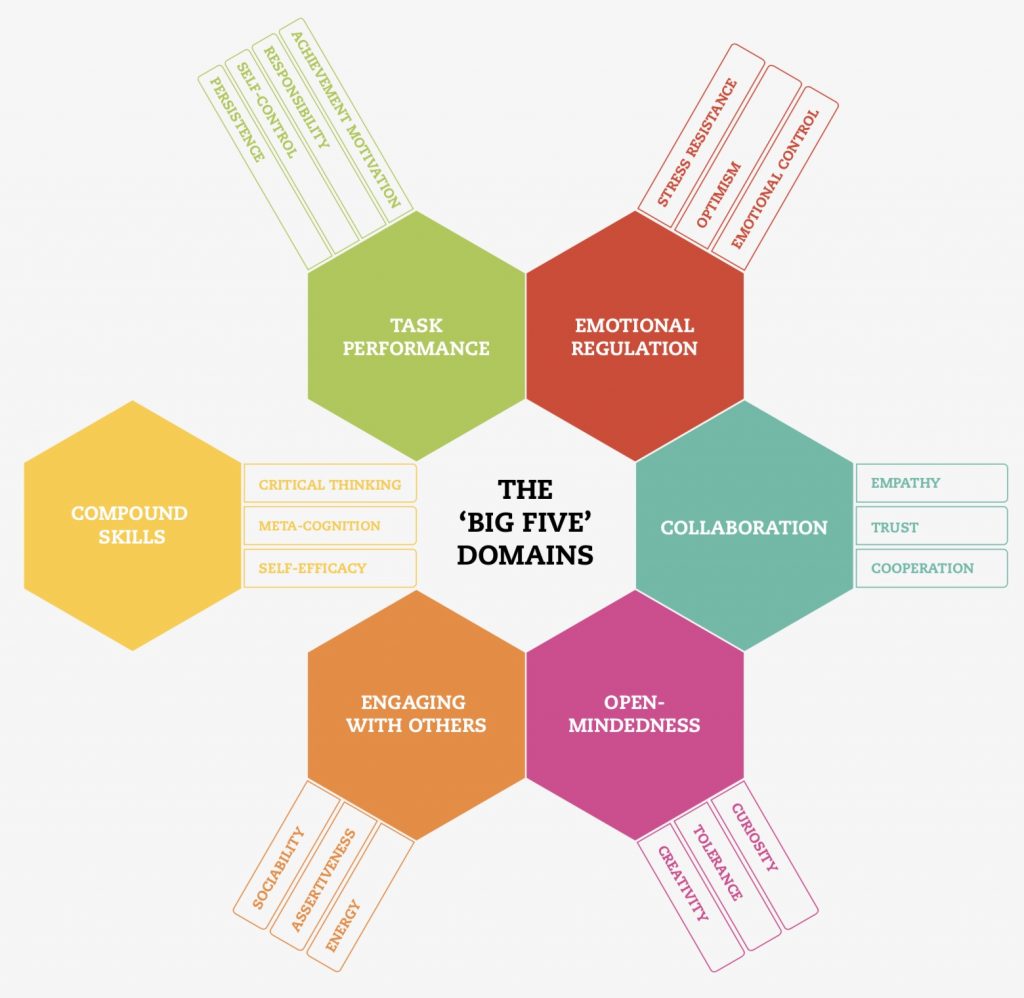
U.S. Statewide Longitudinal Data System (SLDS)
This is a system that some parents might be familiar with, but perhaps may not be familiar with the actual name itself or what this system actually does because each state has created their own special name (see list here) for their data mining system. After talking with several parents of school children, it’s quite possible that parents don’t even realize the data being collected on their children. Whereas this may have begun as a convenient way to better track the education system to make improvements, it is quite clear that is not the current intention.
In 2002, the Institute of Education Sciences (IES) was created as an independent research arm of the U.S. Department of Education. You can read IES’ “Diversity Statement” here. In a nutshell, they have four research centers, all designed to data mine and allegedly improve the education system. There are ten “regional educational laboratories” that assist IES with conducting research, based on regional need and local issues, all with the input of stakeholders, of course. The National Center for Education Statistics (NCES), one of the four main research centers for IES, is the primary federal entity that collects and analyzes data pertaining to education in the U.S. and other nations. They support the Statewide Longitudinal Data Systems program, and are responsible for fulfilling a Congressional mandate to collect, collate, analyze, and report complete statistics on the condition of American education; conduct and publish reports; and review and report on education activities internationally.
Below is the structure of how the center operates:
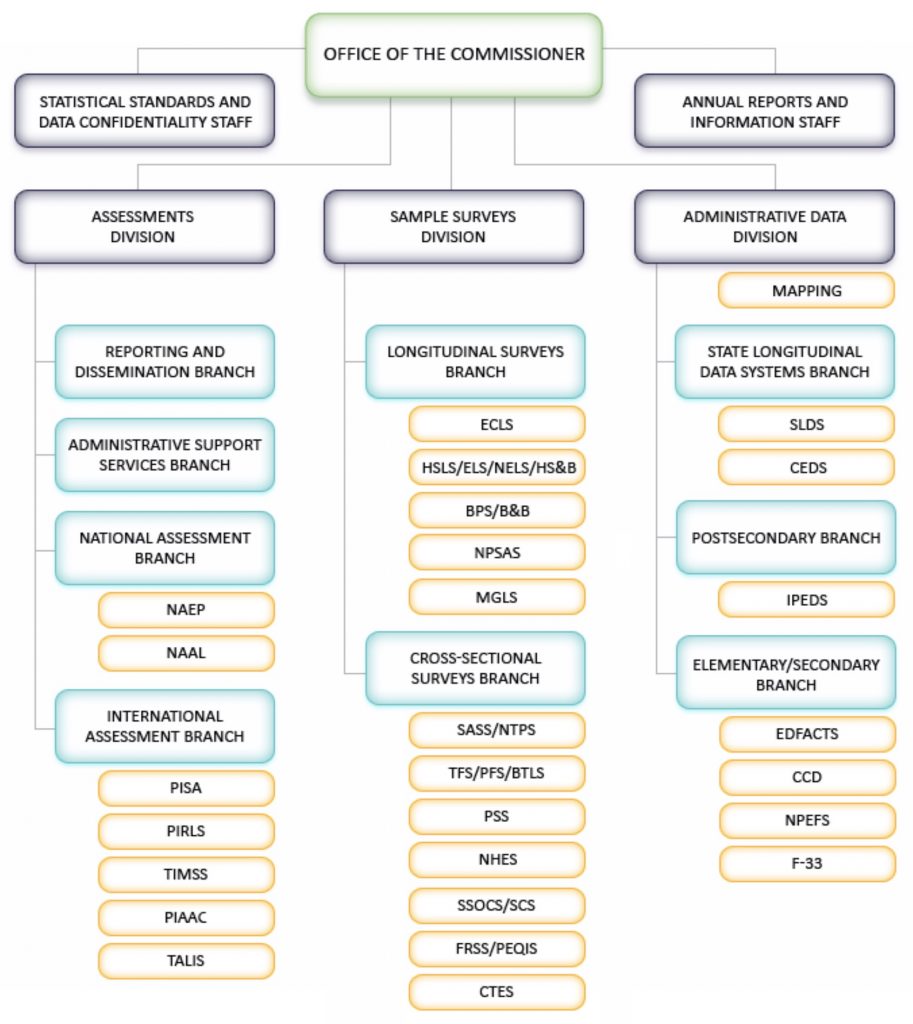
In August 2021, Biden appointed Dr. Peggy G. Carr as Commissioner of the National Center for Education. Carr had been the associate commissioner for assessment at NCES for 20 years. She also leads NCES international studies through the Organisation for Economic Co-operation and Development (OECD), and serves as Vice Chair of the Governing Board for the Program for International Assessment (PISA) at OECD. Isn’t that interesting?
It’s important to reiterate what was stated in part 5 regarding the Institute of Education Sciences (IES) so people understand what this “arm of the government” is interested in. In 2011, they granted the University of Virginia $2,74,333 to evaluate the efficacy of the WINGS for Kids after-school social and emotional learning (SEL) program. This all goes way back.
Getting back to the Statewide Longitudinal Data System (SLDS). To recap, IES was created in 2002. SLDS was first implemented in 2005 with 14 states jumping on board. In 2007, 13 additional states also got on board. Over the past 15 years, there have been six rounds of SLDS funding with 47 states, the District of Columbia, Puerto Rico, the Virgin Islands, and American Samoa having all received at least one SLDS grant. All 50 states have the ability to connect data between systems. Twenty-nine states and the District of Columbia have a centralized system and twelve states have a federated system.
Three-year grants are doled out to states ranging from $1.5 – $6 million per state to implement new pilot programs, integrate new data mining, and/or add hardware and software features to their system. Much of the data contained student demographics, grade level, enrollment and completion, attendance, and state assessment scores, with students having unique identifiers and K-12 student data linked to other data. But under the guise of Covid, they are evolving into the social, emotional, behavioral data points as well.
In 2019, more than 25 states received grants to advance and upgrade their longitudinal systems for new integration, update for “equity” and the modernization project. Some of these involve linking child welfare and other data into them. They all want the systems to have interoperability. In Wyoming they are seeking an “identity management solution for linking individuals,” and in Texas they utilize Ed-Fi which is a data system developed by the Michael & Susan Dell Foundation, who happens to be involved with the digital ID agenda as well.
What’s most concerning is the 2022 newly named “Using Longitudinal Data to Support State Policymaking” grant program to expand state agencies’ use of their State Longitudinal Data System (SLDS) for generating evidence in support of education policy decisions. States can apply for these grants in collaboration with other organizations. Under this “new name” states may use grants to identify which students didn’t engage or progress at expected rates during Covid, and the reasons why, and to “develop evidence on the implementation and impact of programs and policies intended to help these students fully reengage and progress in their education.” In other words… “bring us some evidence we can use to further SEL programs through new policies.” They would like this research to address pre-kindergarten, K-12, postsecondary, and adult education, and should be measured by their:
• Social, behavioral, and emotional learning
• Academic learning
• Progression through the education system
• Preparation for the labor market (for the digital citizen workforce they are building)
• Interest, motivation, and participation in their education (SEL-based language)
Many people may think this is important due to what children have had to endure throughout the Covid scandal. Sure, in a just and kind world where the data is being used to actually help children as opposed to manipulate them, but unfortunately, those behind these schemes are neither just or kind.
One example of how SEL is being worked into SLDS happened back in June 2018 when the National Science Foundation, who’s up to their eyeballs in agendas against humanity, awarded $50,000 to the Vanderbilt University to develop a digital platform for social-emotional learning that consists of a software framework that collects data from user engagement to highlight risk factors affecting children’s performance in social and educational settings. This data supplements the P-20 state-level system. This newly integrated platform will allegedly provide a “cohesive message for transformation, moving children and communities from risk to resiliency, positive character development, and overall wellness”…. with a cherry on top.
Another example is Connecticut’s $3.2 million grant by NCES in 2019 to accelerate additional data mining such as social services, child welfare, higher education financial aid, and homelessness, while expanding their data analytics and access across participating agencies with research on five primary topics to improve policy. The digital identities are being rolled into the children so that their “social score” will follow throughout their lifetime.
As of 2018, K-12 student data included in the SLDS is shown in this chart below. This is going to look drastically different in years to come, with social, emotional, and behavioral information all rolled in, along with social services, child welfare, social scores, all of which will build their digital identity.
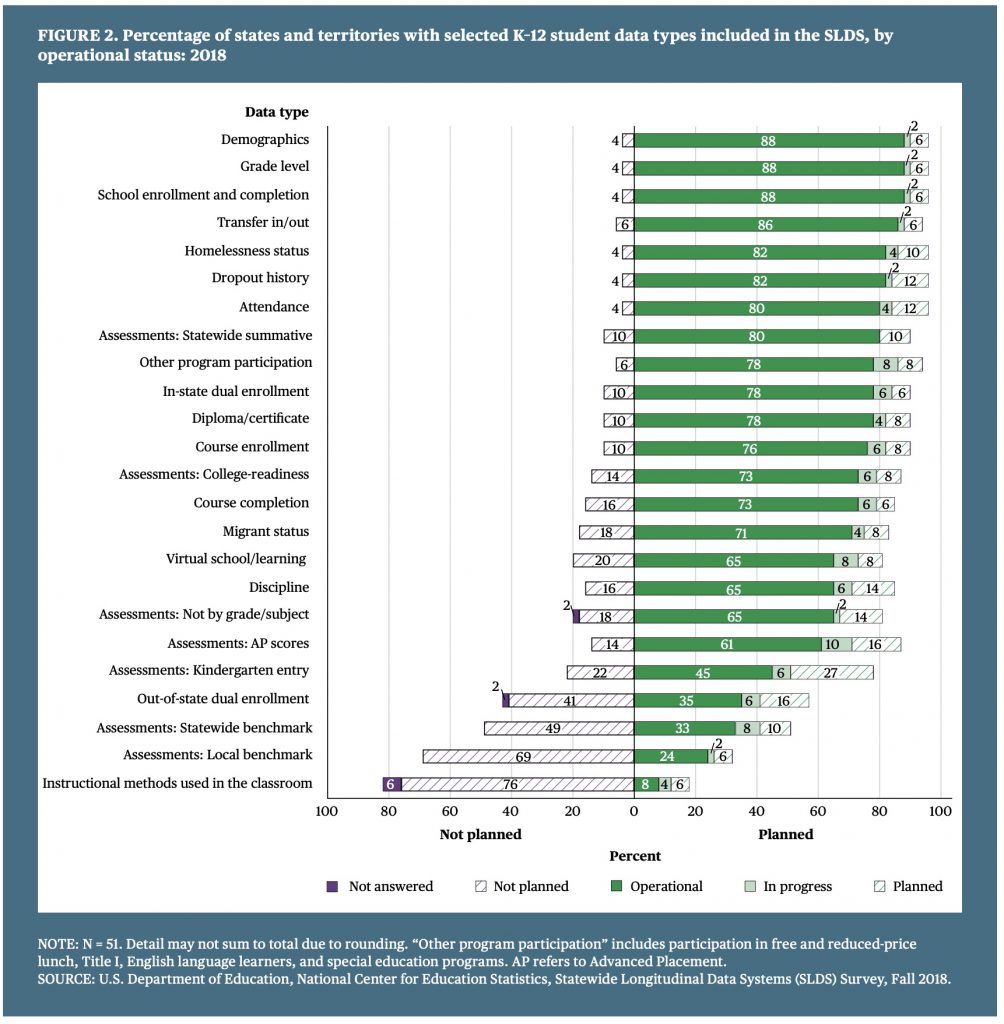
For the complete profile of data capacity in 2018, click here.
Click here for a 50-state comparison on SLDS and additional data.
National Science Foundation (NSF)
NSF was covered in part 5, but this particular award pertaining specifically to “measurements, tracking and data” was not. This is a prime example of how they intend to incorporate smart devices and technology into social-emotional learning (obedience training). The NSF has been awarding grants under their “Smart and Connected Communities” project to states across the country to help buildout the community level smart grid control system. See what your state is up to on this handy interactive map.
This specific award to Florida International University happens to target measuring social-emotional learning through a smart wearable device in STEM learning settings. “The smart wearables will sense interaction and responses between the children and their parents and educators, using embedded machine learning technology to recognize supportive behaviors. The perceived behaviors will be sent to a cloud server where adaptive interaction strategies will be identified from either online psychological consultation or artificial intelligence. These interaction strategies will then be provided to the parents and educators in the form of guidance cues to promote a supportive STEM learning environment around the children.” They are trying to understand how to best implement smart technology with psychological strategies by producing a set of adult-child behavioral targets “that are essential to children’s development of social, emotional, and learning skills.” In other words, they are training AI to train humans into an obedient enslavement system.
Panorama Education SEL Measurement Tools Deemed Number One
According to a 2021 report by Tyton Partners, supported by the Bill & Melinda Gates Foundation and the Collaborative for Academic, Social, and Emotional Learning (CASEL), has ranked them as the number one supplier of social-emotional learning (SEL) measurement tools. Panorama currently serves 15 million students in 21,000K-12 schools across 1,500 districts in 50 states, providing survey and analytics software to gather information on students, teachers, and parents, with their focus on social-emotional learning and emphasis on equity and inclusion. Of course, they’ve also ranked CASEL as the top SEL framework used by schools, and Second Step as the top SEL curriculum provider.
The social-emotional learning survey that Panorama uses, was created by Dr. Hunter Gehlbach, Vice Dean at the Johns Hopkins School of Education, and his research team at the Harvard Graduate School of Education. The survey has over 22 survey topics to measure students’ social-emotional skills and competencies, which they say includes growth mindset, self-management, and social awareness. None of this is about academics, though they like to toss that word in on occasion. Not only do they collect endless amounts of data, they provide districts with how to take assessment into action with their “SEL Intervention Tracking.”
In what seems like an innocent “checking in” measure to see how children are feeling, they allege that no one will see their responses other than their teachers and school leaders, which is a complete lie being as all of this data is being tracked and aggregated into a database. Furthermore, it creates an environment for pure manipulation, which is what SEL is all about.
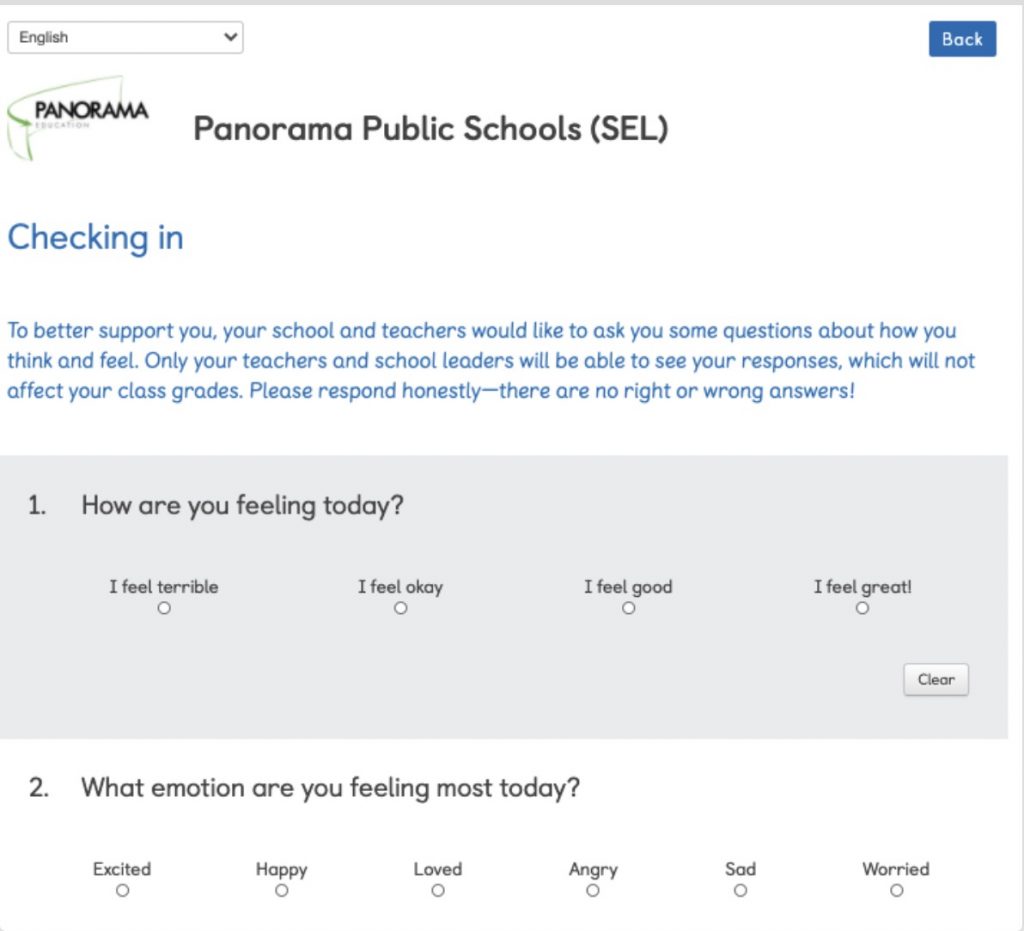
In a survey distributed by Arlington Public Schools in Virginia, students were asked “how often do you feel that you are treated poorly by other students because of your race, ethnicity, gender, family’s income, religion, disability, or sexual orientation?” Other questions included “in your family, how clear are the rules about what you can and cannot do?” and “how much does your opinion matter to your family?” Meanwhile, parents were asked questions that could be a dream come true for CPS, such as “has your child ever been so stressed or overwhelmed that they were not able to participate in regular activities?” According to Forbes, the contract between Panorama and APS cost taxpayers $288,270 for three school-wide surveys over a five year period.
From Panorama Education’s website, which again reiterates the “return on investment”:
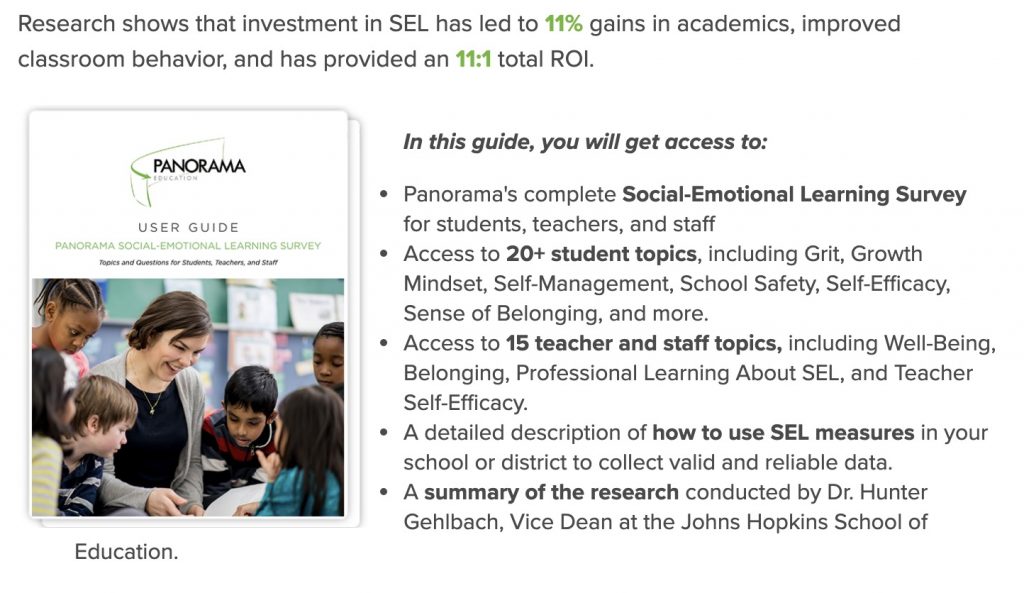
They also provide an Adult SEL Toolkit so educators can “practice self-care while building self-efficacy.” Their toolkit has been downloaded by 24,000 educators and administrators since it released in 2019.
Panorama has created a “Playbook” for interventions that teaches educators how to “change mindsets,” among other things.
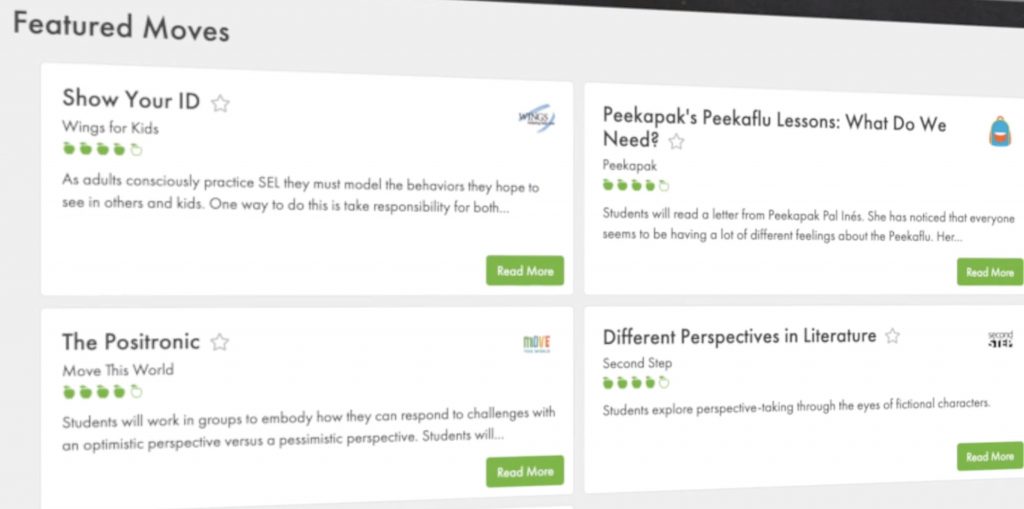
Founded in 2014 by Aaron Feuer, Xan Tanner, and David Carel, Panorama Education was initially backed with a $4 million round of funding by Mark Zuckerberg, Google Ventures, Ashton Kutcher’s A-Grade Investments, and Yale University.
Xan Tanner’s father-in-law is Attorney General Merrick Garland, who coincidentally penned a memo tasking the FBI with investigating alleged incidents of violence against school staff on October 4, 2021, when parents were rising up against Critical Race Theory in schools. This led to America First Legal (AFL) filing a Freedom of Information Act “seeking records bearing on potential conflict of interest concerns created by Attorney General Merrick Garland’s October 4, 2021 memorandum mobilizing the Department’s National Security Division and the FBI against parents speaking out against Critical Race Theory and extreme gender ideology indoctrination in public schools.”
AFL stated that “Mr. Tanner’s financial interest in a business that benefits from CRT and gender ideology indoctrination might render the Attorney General’s participation in measures to promote or protect such activities, including the October 4, 2021 memorandum, ethically problematic.”
Center for The Economics of Human Development – The University of Chicago
This should come as no surprise, after reading the “human capital” section in part 6 of this report which detailed Professor James Heckman’s involvement with SEL and the “Heckman Equation” which is a cradle to grave agenda to “invest, develop, sustain, and gain” so that the future workforce “pays dividends to America for generations to come.” Heckman has been the director of the Center for The Economics of Human Development since 1973.
In February 2018, they held a ‘Measuring and Assessing Skills: Real-Time Measurement of Cognition, Personality, and Behavior‘ 2-day conference whereby leading scholars focused on developing “the next generation of measurements.” On the first day of the conference, several speakers spoke on performance concepts, methods, and examples. Sandra Matz of Columbia Business School spoke about assessing psychological traits via digital footprints, and Michelle Zhou of Juji, Inc. covered “using cognitive virtual agents to infer individuals’ personality for person-centered decision making.” The second day of conferences added presentations on game-based measurements for personalized and adaptive experiences, as well as sociogenomic perspective on continuous personality assessment.
In Zhou’s document covering “virtual agents,” it’s made clear once again that they’ve been working hard at training AI to not only communicate with people, but to study people’s traits and decisions so they can adjust the AI accordingly, and it will most certainly have its place in the workforce and beyond.
Professor Brent Roberts’ presentation on sociogenomic perspective on continuous personality assessment was an interesting hour-and-twenty-minute talk concluding with the fact that til this day, they really have little to no measures in place to assess what factors impact a person’s personality and how that personality may change over time. Based on decades of studies and aggregated data, they are able to discern that therapy can actually alter a person’s personality in as short as six weeks, and because of this, Roberts believes that measurements that involve “feelings” will better establish critical data points. This makes sense as to why SEL surveys and data mining all tend to involve questions around how children and people “feel.” After all, in order to change a person’s personality, you need to understand what mechanisms drive it.
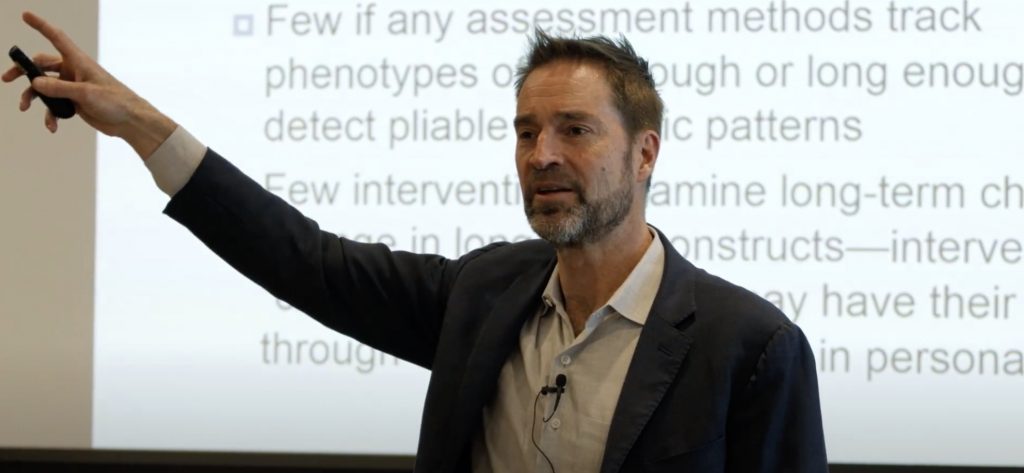
The data also shows that parents play an insignificant role in a child’s personality development. “Our theories are that parents are the most important thing for kids personalities. We may be wrong.” One man replied, “You’re saying it’s not?” Roberts said, “No. So far it’s things like traumatic experiences and peers.”
Roberts notes in his presentation that behaviors and social cognitive variables that are presumed to be less stable and more contextually dependent are just as stable as personality traits.
Roberts said they need to “stop assessing traits” and assess “states” continuously by asking about thoughts, feelings, and behaviors. He gave these as examples – General: feeling nervous, working hard. Contextualized: studying for math, playing video games. Elastic and pliable are what need to be tracked continuously to assess personality changes, he said. He went on to say it can be done with our phones once a month with 12 observations and reiterated that they are missing the elastic and pliable data points. He suggested they need to reach children and intervene before age 10 because ages 10-18 is a period where they are already trying to establish themselves.
Roberts pointed out, “one of the things we really need to contemplate is that the interventions we do that we feel so wonderful about, especially if they’re efficacious, may have absolutely no long lasting ramifications…. we can fool ourselves.”
He concluded that it begs for more continuous assessments using much more creative techniques than have been used in the past. Essentially, the longitudinal studies throughout the decades are focused on traits, which is not enough data to properly assess what exactly produces change in personality.
The fact that SEL measurements being used today are all based very much on “feelings,” is telling. Couple that with their knowledge that traumatic experiences, therapy, and peers are what can alter and shape personalities, and it becomes quite evident what they are trying to achieve.
“Emotional Intelligence” Rolled Up Into A Social Credit Score & Digital Workforce

If anyone hesitates for even one second to think there is a possibility that the digital identity control mechanisms won’t take shape, just send them this robust article by Thales, the 8th largest defense contractor in the world who’s heavily involved in all aspects of the digital ID and biometrics, and tell them to remove the fluff and so-called “convenience” and see it for what it is – full control with complete loss of privacy. The UN, WEF, World Bank, and globalists’ goal of ID4D is to have everyone tracked, traced, surveilled, and controlled by 2030 – from cradle to grave.
Even Florida, the state everyone seems to deem as less restrictive, works with Thales to provide its citizens with their mobile drivers license to verify their identity. Everything is sold to people under the guise of “safety” and “convenience.”
Once people understand the globalists’ grand plan, the veil is removed and it’s easy to see how the SEL psychological obedience agenda ties directly into the global digital citizen workforce. To understand the digital identity agenda to control everyone’s access, spending, and livelihoods, read Corey Lynn’s book on the Global Landscape on Vaccine ID Passports.
As stated throughout this 9-part series, this is a cradle to grave agenda that begins at birth, carries through the education system, into the community and workforce, and straight into your homes until you have left this planet. In fact, the World Bank created ‘Skills Toward Employment and Productivity’ (STEP), which is a survey that collects data through employment interviews about social and emotional skills. The World Bank is heavily involved in the SEL agenda and makes it a mandatory program for certain funding in multiple countries, as covered in part 2 of this series.
It’s no secret that the military industrial complex has long tracked children through early adulthood to snag up those they believe have the skills they are seeking. To put it simply, all of this data mining is using technology and AI to predict and program behavior for future digital citizens, and they want to get them while they are young.
SEL utilizes the education system as a doorway to drive these agendas through while ensuring parents it’s all about their child’s mental well being and future potential. The education indoctrination system in the U.S., and throughout the world, is so all-encompassing with an embedded psychological agenda and historical disinformation that fighting to keep children inside this machine seems almost futile at this point. Creating homeschooling networks that teach children academics, the truth about our history and culture, trade skills, and that do not accept state or federal funding or vouchers seems to be the way of the future – a much better future.
Saying no and not complying are sometimes the best strategy in these war games, especially when it comes to data scraping and digital identities. Be sure to read 22 Ways to Stop Vaccine ID Passports and Why We Must, which is also included in Corey Lynn’s book in chapter 5. It’s also important to Loosen Technology’s Grip on Your Mind when we are in a constant battle for privacy and control over our own lives, without the unnecessary mind control and manipulation tactics being blasted at us on a consistent basis.
Don’t let the globalists box you and your family in – remove the box. Bookmark Corey’s Digs Solutions for ongoing tips and strategies on navigating and bulldozing “their” systems.
This report was sponsored by The Solari Report.
Previous Chapters:
Part 1: Introduction
Part 2: The Programming
Part 3: Spirituality in Education Programming
Part 4: WEF Vision for Global Education System
Part 5: U.S. Department of Education & Multiple Agencies Involved
Part 6: Private Sector Funders
Part 7: Legislation and Billions in State & Federal Funding
Subsequent Chapters:
Part 9: Timeline, Recap List of Over 300 Organizations Involved, and Conclusion
This full 9-part report will be available in a single PDF for download in The Bookshop once it’s published in its entirety.









Thank you Catherine! What a wealth of information and knowledge!